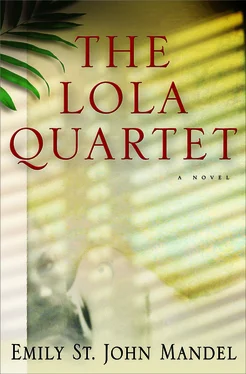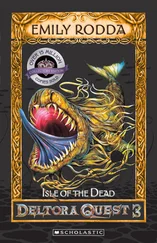"At a certain point all your friends are couples," she said, when he asked about this. "You move through the world in pairs. They had to pick one of us."
"So they picked the guy who left their friend?"
"Apparently his girlfriend's lovely." She smiled as if she'd told a joke, and he realized how rarely he saw her smile. In all of his memories she was serious and efficient: Eilo sitting by his hospital bed after the time he'd walked home from his miserable senior prom and gotten heatstroke, Eilo putting a Band-Aid on his knee when he'd fallen off his skateboard at age seven, Eilo buying him a jacket at the mall when he was ten. What all these memories had in common was the absence of his parents, but he'd always known where they were: his father was at the office or on a business trip, his mother at home watching television. Neither of them had ever displayed the slightest interest in his or Eilo's activities. He'd never understood why they'd bothered to have children.
"When did you last see Mom and Dad?" he asked, sitting with Eilo on the living room floor that night. Eilo didn't own a table.
She finished her slice of pizza, considering the question.
"I don't know," she said. " Maybe a couple years ago?"
"I'm thinking about visiting them tomorrow."
"Why would you want to do a thing like that?" Eilo stood swiftly and carried the empty pizza box to the kitchen.
"I don't know," he said to her receding back. He did know. He was beginning an investigation and it had to start somewhere, but he didn't want to tell Eilo about it. He wanted something of his own. "It just seems like a kind thing to do."
Th e i r p a r e n t s lived in a development called Palm Venice, no more than a half-hour away by car. The neighborhood had been imagined in the late '50s as Florida's answer to its namesake, a tropical paradise where you might travel by boat to your neighbor's house for a barbecue, but the canals that ran behind everyone's back lawns connected eventually with the swamps and therefore now harbored a glittery-eyed population of giant lizards and snakes. Residents saw pythons swimming in the canals sometimes, undulating ribbons with teeth. The lizards, the Nile monitors, watched the human world from the edges of backyards. A local woman swore she'd seen an anaconda but no one believed her. Still, Gavin thought as he was parking the car, there was no reason why not. As he walked up the concrete path to the front door he was remembering walking with William Chandler, murky water up around their knees and his legs soaked with sweat beneath the hip waders, a thermos of ice water in his backpack. The cool of the thermos against his spine the only thing preventing him from fainting in the heat. These are ideal conditions for an anaconda, Chandler had said, you can quote me on that.
His parents had purchased their house after Gavin and Eilo had
left home. He'd been here twice before, and he sometimes thought of it as a mausoleum. It was cool and almost silent, five thousand square feet of pale walls and white carpets. He hadn't seen his mother in some time. She was somewhat wider than he remembered when she opened the door.
"Oh!" she said. "Gavin! Sweetheart. It's nice to see you again."
"You too," he said. He wasn't sure what to do next, so he hugged her. It was awkward. She exuded a complicated medley of scents: expensive face creams, perfumed lotions and cleansers and fabric softeners, a note of lemon in her hair. But mostly wine, a barely perceptible sweet staleness on her skin.
"Are you just passing through on business?"
"I'm not passing through. I'm living with Eilo."
"You live with Eilo and Mike?"
It wasn't his story to tell, but it seemed impossible not to now. "They've broken up. Eilo and Mike aren't together anymore."
" Close the door," she said. "You're letting in the heat."
They stood for a moment looking at one other. He tried, as he always had, to read the expression on her face. She had the warm but oddly blank half-smile she wore in most of his memories.
"Well, come in!" she said, too loudly. "Come in! How long have you been back in Florida?"
"A few weeks." He was following her into the kitchen.
" Would you like a Coke?"
"Just water, thanks. Or orange soda if you have it." But she wasn't listening, she was setting a Coca-Cola and a glass of ice before him, turning back to the fridge for a half-empty pitcher of sangria. He watched her in silence.
"It's the most refreshing thing this time of year," she said. She was pouring herself a glass.
"You drink that stuff all year."
"Are we going to get nasty about drinking again? It's natural ," she said. "It's fermented grapes and fruit pieces. Vitamin C. You need to loosen up a little. Well, cheers," she said.
"Cheers." Gavin picked an ice cube out of his Coke, let it melt on his tongue while he watched her. "How have you been?" he asked, around the ice.
"Oh, just fine," she said. "Just fine indeed. Enjoying life in the sunshine state."
"But what've you been doing?" He knew what his mother did— she watched television, she shopped, she drank too much, she went for manicures and got her hair done and ate dinner either alone in front of the television or at expensive restaurants with her friends, she passed out on the sofa— and he wasn't sure why he was pressing the point, except that the house made him somehow claustrophobic despite its vastness and being with her always made him desperate for substance. Tell me something real, he wanted to scream at her sometimes, tell me anything at all, but as always she managed to deflect him.
"Why would I be doing anything out of the ordinary?" she asked.
"I don't know what the ordinary is," he said. "I haven't seen you in a while."
"Two or three years," she said agreeably. "You came down for that one Christmas."
"I think that was five years ago," Gavin said.
"Five," she said. A flicker of uncertainty crossed her face. " Really?"
"Is Dad home?"
"He's on a business trip."
" Where did he go this time?"
"New York," she said.
This hit Gavin harder than he would have expected. How often in
these past ten years had his father come to New York City without telling him? How many times had they passed within blocks of one another, how frequently had his plane passed over Gavin's apartment? When Gavin had stood by the window in the New York Star newsroom in the mornings, sipping his coffee and looking down at the teeming masses of humanity forty-three stories below, how many times had his father been among those dark specks on the sidewalk?
"Excuse me a moment," Gavin said. He left her sipping sangria in the kitchen and set off down the hall in the direction of the closest bathroom, where he splashed cold water on his face and contemplated climbing out the window. It wouldn't be difficult. He was on the first floor. The frosted-glass window was open just a crack and the outside world with its grass and leaves and flowers looked like freedom to him. On his way back he veered into the dining room. It had an underused emptiness that reminded him of unpopular museum halls and pristine Park Avenue lobbies. There were stiff-backed upholstered chairs that no one ever sat in, a glass table with space for fourteen.
His mother's collection of glass and crystal figurines occupied most of an oak cabinet along one wall. He opened the cabinet door and let his eyes play over the cherubs and the tilt-headed cats until he found a glass dog of indeterminate breed with very large eyes and a tiny stick at its feet. He extracted it carefully and carried it back to her.
"Mom," he said, "where did you get this one?"
"Oh," she said, "you and Eilo gave me that for my birthday one year. It was the summer after you graduated high school, right before you went north."
Читать дальше












